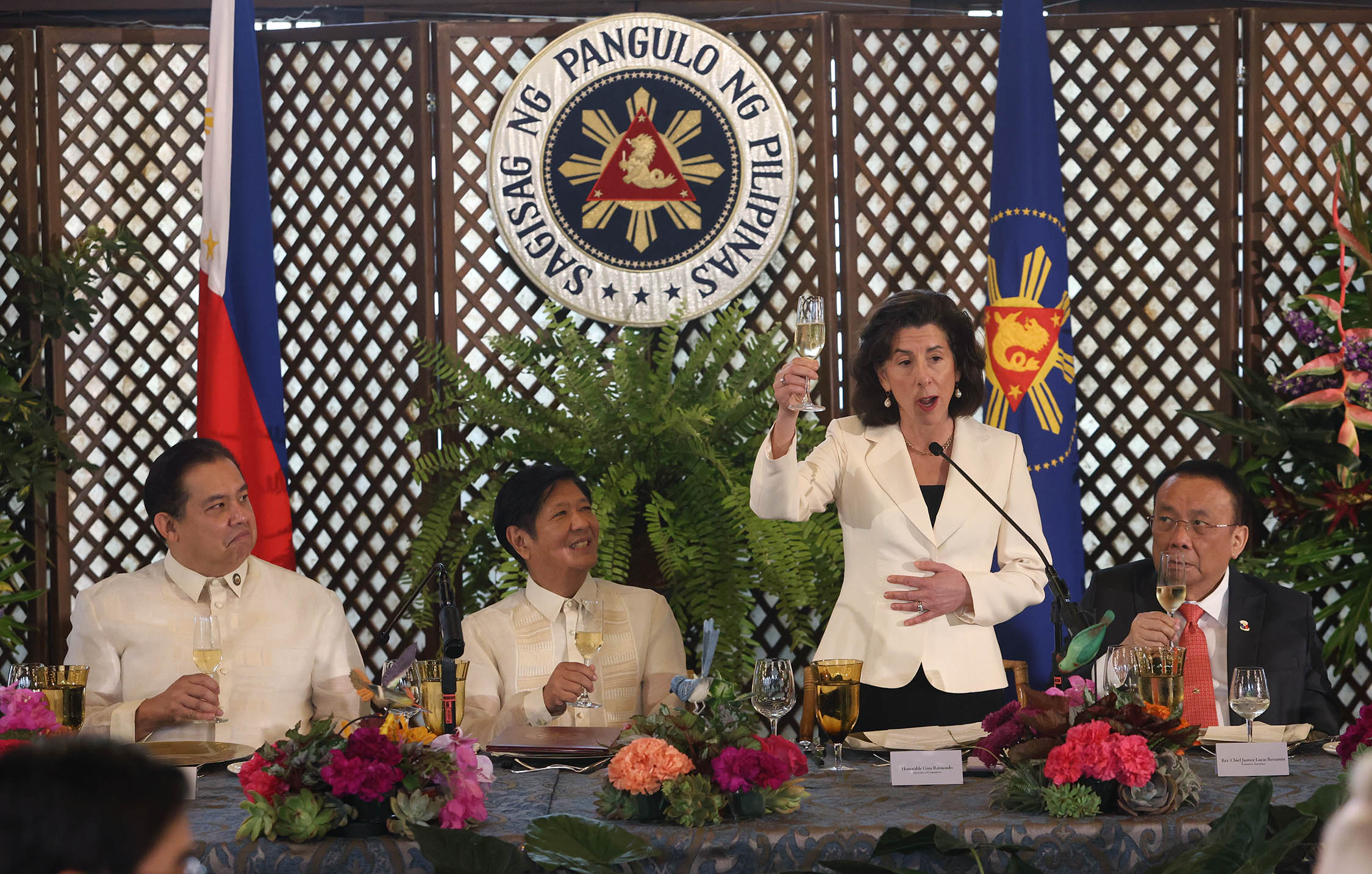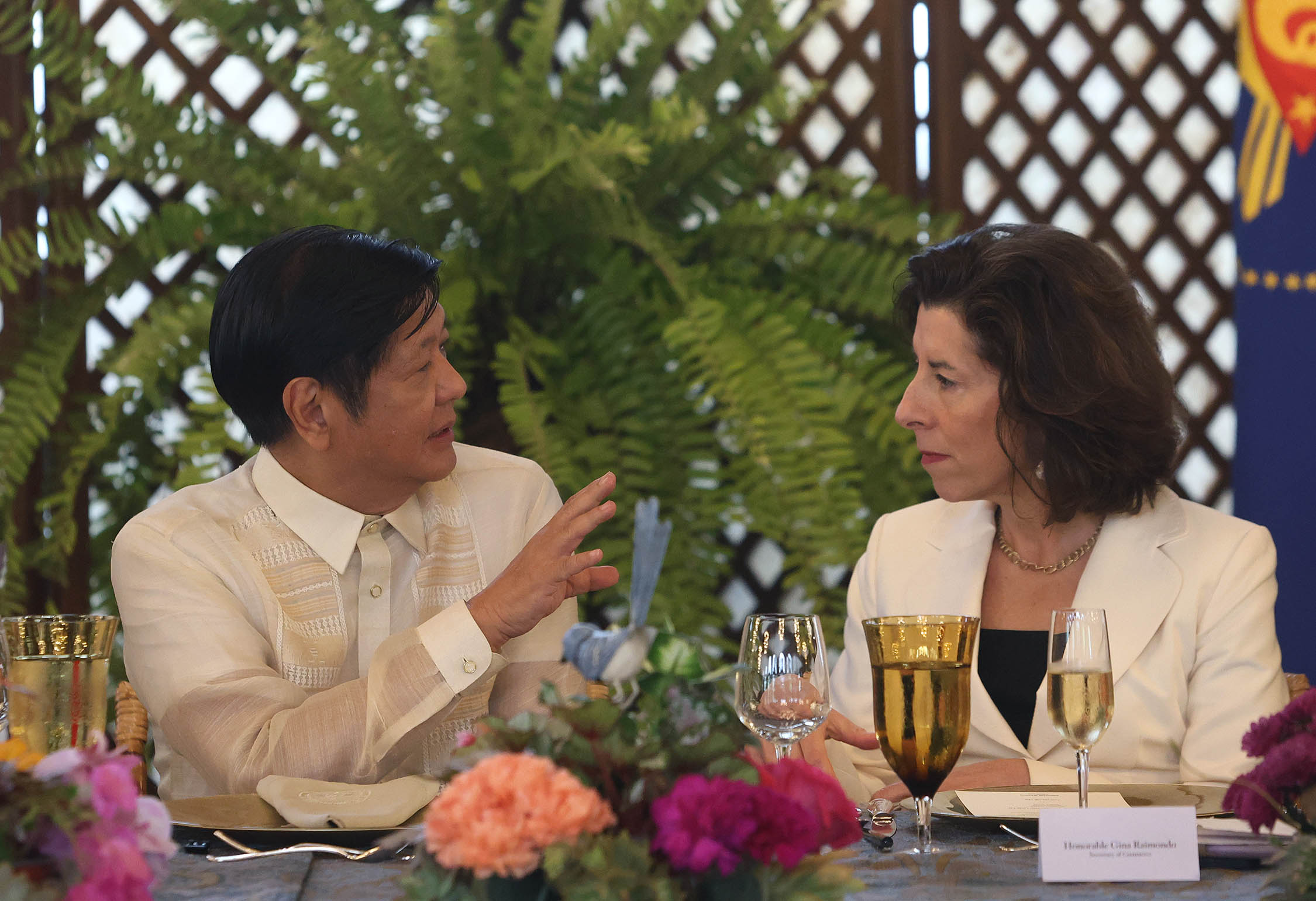$1-B investment deals seen in US trade mission

‘PARTNERS IN PROSPERITY’ US Secretary of Commerce Gina Raimondo makes a toast during a luncheon on Monday hosted by President Marcos which her delegation attended, together with Speaker Martin Romualdez, Executive Secretary Lucas Bersamin and other officials. —MARIANNE BERMUDEZ
American companies are set to announce investments amounting to more than $1 billion (about P56 billion) in the Philippines, US Commerce Secretary Gina Raimondo said during an official visit to Manila on Monday.
The investments would be in areas such as solar energy, electric vehicles and digitization, she said, adding that American companies were eager to do business in the Southeast Asian country.
Raimondo is in Manila for a two-day trade and investment mission on behalf of President Joe Biden.
The White House said in a statement the US delegation to the Philippines includes executives from 22 companies representing United Airlines, Alphabet’s Google, Black & Veatch, Visa, EchoStar/DISH, United Parcel Service (UPS), Boston Consulting Group, KKR Asia Pacific, Bechtel, FedEx, Mastercard and Microsoft.
In a press conference at Solaire Resort and Casino in Pasay, Raimondo said “These companies are announcing over a billion dollars of US investments, including creating educational opportunities to over 30 million Filipinos in the form of digital upskilling, AI (artificial intelligence) training.”
The US official said the expected deals also include the establishment of an electric vehicle education center as well as solar and nuclear projects to support the Philippines’ energy and climate goals.
READ: US companies to announce investments of over $1B in PH
“And we’re announcing a new airline route opening up travel and tourism to the beautiful beaches of Cebu among other projects,” she added.
Economic security
United said last week it would launch new flights from Tokyo-Narita to Cebu starting July 31.
For his part, Philippine Trade Secretary Alfredo Pascual said the US trade mission symbolizes Washington’s strong support for the country’s economic security through trade and investments.
“A stronger partnership between the US and the Philippines cements our position as an economic force. This position benefits our country and fortifies our standing as an ally of the United States,” Pascual said during the same event.
Pressed for comment when they think the investments would materialize, the Philippine official said it would depend on the nature of the project, noting that it could take several weeks to years.
“The training, that would be immediate. In fact, we already have an agreement,” Pascual said, adding that investments that take longer to materialize include energy projects that normally materialize after five to seven years.
During their meeting, Pascual said they also raised other key issues, including a swift implementation of US government support in workforce development as part of the recently passed CHIPS Act, which mandates funding from the US government to the Philippines and other developing countries to make the ecosystem of their local semiconductor industry more conducive to American investors.
Another issue in which the Philippines sought assistance from the US delegation is the detention of apparel exports and shrimp paste shipments.
Pascual said the US had banned apparel exports using cotton from a province in China where the Uyghur population is reportedly being persecuted.
“But the fact of the matter is that the cotton used by our apparel companies does not come from China but from Brazil, Turkey and the US itself,” Pascual said.
Partner of choice
The White House in January said a trade mission would be sent to boost US companies’ contribution to key Philippine sectors, including infrastructure, clean energy, critical minerals, agriculture and the innovation economy.
The Philippines and the United States are long-standing allies bounded by a 73-year-old mutual defense treaty.
President Marcos has sought to deepen relations beyond defense cooperation to include economic partnerships.

SUSTAINING TIES President Marcos talks to US Secretary of Commerce Gina Raimondo during a luncheon he hosted on Monday for the visiting US official and her delegation.—MARIANNE BERMUDEZ
“The US-Philippine alliance is ironclad,” Raimondo said at the joint briefing with Philippine officials. “It is sustained over 72 years, and we remain steadfast friends and, increasingly, partners in prosperity.”
Security engagements between the Philippines and the United States have stepped up considerably under President Biden and Mr. Marcos, with both leaders keen to counter what they see as China’s aggressive actions in the South China Sea and near Taiwan.
Raimondo said she was often asked if the United States was asking countries in the Indo-Pacific region to choose between China and the United States.
“Absolutely not. But we want the United States to be the economic partner of choice,” Raimondo said. “For that to happen, we have to show up and show up in the country with money, with collaboration and consistently show up.” —WITH A REPORT FROM REUTERS INQ
